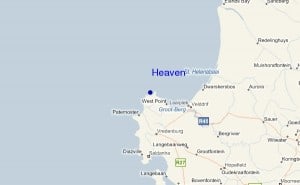In my current line of work—I’m the administrator of three small parishes on an Indian Reservation in South Dakota—I deal with a lot of funerals. I schedule them; I lead prayers; I empty the ashes out of the censer afterwards. And I’ve helped to bury everyone from the saintly to those who haven’t seen the inside of a church since they were baptized.
The job causes one to hear and say and think quite a bit about the life after this one, which is a good thing: in our liturgy, in fact, we ask God to turn our thoughts from the things of this world to the things of heaven. And contrary to what skeptics like Nietzsche thought, a lively belief in heaven helps one live a good life here below; the courage of the saints and martyrs would never have been possible without it.
And yet…
…and yet, I often find myself cringing at the things people say about heaven. Atheists have historically mocked Christians’ belief in paradise as an opiate—a comforting fantasy, a fairy tale we tell ourselves to soften the pain of loss. And sometimes I find myself agreeing with Christianity’s critics.
I’ve noticed, for example, a tendency among many to attempt to remake heaven in our own image. So if Grandpa really loved donuts, heaven gets described as an all-you-can-eat Dunkin’ Donuts, open 24 hours, where the Bavarian cream is always fresh and smooth.
You will be relieved to know that even though I cringe inwardly when I hear someone preach hope in an everlasting supply of jelly donuts, I don’t jump in with, “Actually-it’s-not-like-that.” Still, I can’t help but think how awful such a “heaven” would be—even if one were spared the indigestion. As Pope Benedict put it, reflecting on the possibility of an endless prolongation of this life: “…to live always, without end—this, all things considered, can only be monotonous and ultimately unbearable” (Spe Salvi, 10).
***
Part of the problem may be taking too literally the metaphorical language of “place” we often use to describe heaven, hell, and purgatory. Thinking of the afterlife in terms of locales can make for great poetry (see Alighieri, Dante), which in turn can yield brilliant theological insights. But every metaphor has its limits. The limit of thinking of heaven as a place, it seems to me, is that it turns the beatific state into something external.
From where I live I can drive from South Dakota into northern Nebraska in a little over half an hour and remain essentially unchanged by the experience. The scenery changes somewhat, as do the legal jurisdictions, but I stay the same. And it doesn’t really matter who I am either; anyone could make the same trip. Any human being, assuming the logistics could be worked out, is at least theoretically capable of visiting Nebraska. The only problem is—sorry, Huskers—heaven is not like Nebraska.
Heaven, that is, has a lot more to do with who rather than where we are.
And who we are has more to do with our relationships than with physical accidents like location. We have many different relationships throughout our lives, most of which are not particularly significant. The relationship I have with the clerk at the 7-11 is fleeting and trivial—“Have a nice day!” I say, and that’s it.
Other relationships define who we are. This reality is expressed in the way names are given in certain languages; think of all the Scandinavian “John-sons” or “Peter-sons,” expressions of the fact that who our parents are at least partially defines who we will be. Or think of the traditional practice of a wife taking on her husband’s family name at marriage, which can be a public recognition that one is entering into a relationship so profound that it changes one’s identity.
At the beginning of the Catholic vigil for the deceased, the celebrant declares: “we believe that all the ties of friendship and affection which knit us as one throughout our lives do not unravel with death.” In other words, our relationships survive.
The survival of our relationships, however, doesn’t in itself mean immortality. It could mean just warm memories that themselves perish with those who hold them. Immortality requires a relationship with something—or, rather, Someone—eternal.
Heaven, I believe, is just such a relationship.
***
Think a bit more deeply about all of this, and more trouble begins to arise for the comforting commonplaces people repeat about heaven. It’s easy enough to move from place to place—but how many people are involved in a relationship with God so profound that it defines who they are?
What if we took away not only Grandpa’s Dunkin’ Donuts, but absolutely everything else about him—except God? For many, the disappointment would be cutting, and deep. And it is just such “disappointment,” if I may call it that, which characterizes that other place, the one we don’t like to talk about so much when contemplating death.
Other, even more troubling questions present themselves as well: doesn’t the fact that we so often characterize heaven almost completely in terms of earthly trivialities itself provide evidence of how far we are from achieving the real thing? Have we reached a point where our vision of heaven more closely resembles hell than what the Gospels promise?
All sorts of theological dangers begin to yawn like gorges around us when we begin to speculate about the afterlife.
Sometimes we are reminded that the Church has never officially declared that anyone is in hell. While this is true, it seems to me that almost nothing follows from it being so. The Church has never officially declared that I had yogurt and orange juice for breakfast, and yet I did. The Church is right not to waste time cataloguing the damned because she’s in the business of salvation, not condemnation. Unfortunately, not everyone in this world is in the same business as the Church.
While none of us can ever ultimately know the state of another’s soul, the words of Jesus, who is a bit more knowledgeable on the subject than I am, don’t exactly lend themselves to a carefree attitude toward the afterlife. “Enter by the narrow gate,” he tells his disciples. “For the gate is wide and the way easy, that leads to destruction, and those who enter by it are many. For the gate is narrow and the way is hard, that leads to life, and those who find it are few” (Matt 7:13-14).
I don’t read that passage at funerals.
***
Why bring it up then? you might rightly ask. Why rain on the parade that’s heading down to Dunkin’ Donuts heaven?
Well, Jesus generally doesn’t go around scaring people without reason, and the more common theological gorge into which we contemporary Christians tend to plunge is something known in the old scholastic vocabulary as “presumption.”
Those scholastics wrote quite a bit about presumption, about how precisely it was opposed to the virtue of hope, for example, but much of their writings boil down to this: we should never take God’s mercy for granted. Just as it is wrong to assume that our enemies are going to hell simply because we don’t like them, so it is also wrong to assume that we ourselves are just so adorable that God couldn’t do without us.
If I could choose a more contemporary word to substitute for “presumption,” it would be “entitlement.” While I can’t say I engage in much fire-and-brimstone preaching myself, I’m often bemused at the reaction of those who are critical of such sermons. “How dare he?” they seem to say. “How dare anyone suggest that I am not inevitably destined for anything other than eternal bliss?”
And it’s presumption, a subtle entitlement, that lurks behind the (sometimes unspoken) how dare…! I’ve even heard people say, in huffy tones, “Well, I just couldn’t believe in a God who would allow anyone to enter hell,” as if God were just a big ol’ meanie for not cramming Dunkin’ Donuts down our throats. How dare He?
The problem is, we can only say how dare he, only feel justly outraged, if someone is trying to take away something we’ve earned, something it is our right to claim. And none of us deserves heaven. None of us has closed the gap between the eternal and the mortal, between God and man. Such a gap is itself so infinite that it would require a miracle to close it, a power beyond the force of anything we humans could ourselves know or imagine or construct.
And yet—Some human did just such a thing, on a rocky outcropping named Golgotha.
And the proper response to such a gift is not entitlement, but gratitude. Not because this time God somehow managed to fulfill our expectations; not because we are getting what we deserve; but precisely because we are getting what we don’t deserve, could never deserve, have no right to expect.
All this leads me to a simple question: can we still be surprised by heaven?
Presumption—entitlement—is so deadly, spiritually, not just because of the tinge of narcissism that comes with it, but because it always signals the dying of our capacity for surprise, because the presumptuous will never find themselves trembling, like Mary Magdalene at the tomb, in shocked gratitude.
Because it means settling for a jelly donut when we could have had eternity.





